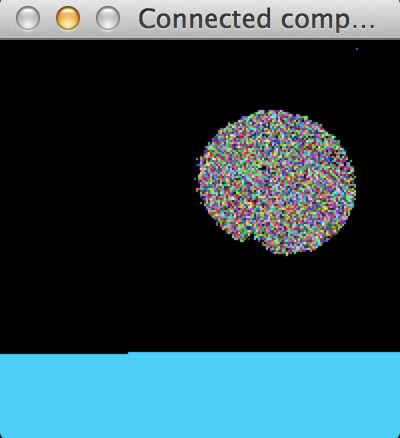Artefacts when filling elements in GpuMat in custom CUDA kernel
I have a small kernel that goes through each element in a binary image of type CV_32S assigning 0 to it, if its value is 255, otherwise the thread's unique ID, so I need a sequential 1D index into the GpuMat's data (label_connected_components is supposed to do more, but this is just the first step that goes wrong so far). I am using OpenCV 2.4.9 installed using Homebrew. Here is a MWE:
#include "gpu/Utils.hpp"
#include "cpu/Utils.hpp"
#include <opencv2/core/core.hpp>
#include <opencv2/highgui/highgui.hpp>
#include <iostream>
#include <stdexcept>
int main() {
try {
cv::Mat h_image = cv::imread("../images/t82_test_image.bmp", CV_LOAD_IMAGE_GRAYSCALE);
if (h_image.empty()) {
throw std::runtime_error("Unable to find image");
}
// Convert image contents to 32-bit signed integers
h_image.convertTo(h_image, CV_32S);
// Upload image to the device
cv::gpu::GpuMat d_image;
d_image.upload(h_image);
// Label connected components
utils::gpu::label_connected_components(d_image, 8, true);
// Download image from the device
h_image.setTo(0);
d_image.download(h_image);
// Display the labelled image
cv::Mat h_color_image(h_image.size(), CV_8UC4);
utils::draw_connected_components(h_image, h_color_image);
cv::imshow("Connected components", h_color_image);
cv::waitKey(0);
} catch (std::runtime_error& ex) {
std::cerr << "Error: " << ex.what() << std::endl;
return 1;
} catch (cv::Exception& cvex) {
std::cerr << "OpenCV error: " << cvex.what() << std::endl;
return 1;
}
return 0;
}
And here's the kernel:
// Calling the kernel:
// const dim3 threads(1024, 1, 1);
// dim3 blocks = (d_image.size().area() + threads.x + 1) / threads.x;
// initialize_labels<<<blocks, threads>>>(d_image);
__global__ void initialize_labels(cv::gpu::PtrStepSz<int> d_in) {
unsigned int gid = threadIdx.x + blockIdx.x * blockDim.x;
if (gid >= d_in.cols * d_in.rows) {
return;
}
d_in.data[gid] = (d_in.data[gid] == 0 ? gid + 1 : 0);
}
Finally, here's the artefacts I'm talking about:

The multi-colored blob is fine (unique label -> unique color), but the light blue area is not...My internet research has led me to believe I am messing up the access by not accounted for the GpuMat's step size (in bytes), but I cannot firgure out how to use it with integers. I have another kernel where access is done using operator(y, x) and that seems to work fine, but it's hard to tell when the first step does not work...What am I doing wrong?
EDIT:
I've made some progress. If I use 2d indexing (int tx = threadIdx.x + blockIdx.x * blockDim.x, ty = ...), it works. If I use linear indexing (only calculate tx), index the data like this: int id = threadIdx.x + blockIdx.x * blockDim.x and create the GpuMat as continuous, it also works, which makes sense since the data needs to be continuous to support direct indexing. However, looking at the 3.0-dev version on github, I can't seem to grasp why the first 2d indexing method works. The PtrStepSz struct seems to be doing the same as my linear index, except for using the step value and casting from char to its template type...
